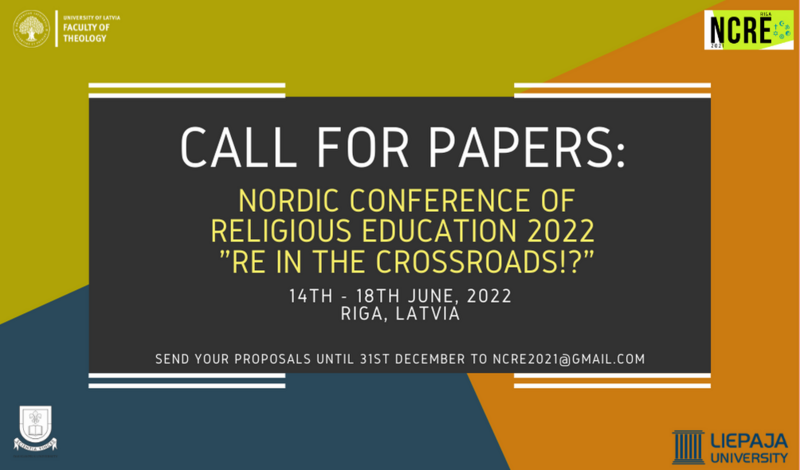2ND CALL FOR PAPERS: NCRE 2022 "RE IN THE CROSSROADS?!"
Call for papers are now closed!
16th Nordic Conference on Religious Education
Theme: "RE in the Crossroads?!"
Dates: 14th - 18th June, 2022*
Location: University of Latvia, Riga, Latvia. Conference was postponed for a year so that the participants would have the opportunity to meet in person.
The last few decades are marked by evaluating the identity of religious education as a learning subject in the context of diverse contemporary challenges. Religious pluralism, atheistic and agnostic perspectives, artificial intelligence, and the rapid development of information technologies create the conditions in which traditional practices of religious education are searching for innovative solutions. ‘Crossroads’ is a metaphor that reveals the diversity of these research directions. What does religion mean in terms of religious education itself? There is still a debate about the relationship between the concepts - religion and worldview and their link to the educational content in general. What is the target audience for religious education – pre-school children, primary and secondary school learners, university students, and secular society in general? Generational reciprocity and the search for answers to existential questions lead to the characteristics of generations. How can a digital generation learn religious education? How can information technologies be employed in the learning process? Artificial Intelligence (AI) is no longer the future, it is our present. Thus, it creates conditions for discussing the relationship between a human being and AI in the context of faith, religion and worldviews. What innovations are already available in didactics? Didactics is one of the scientific disciplines, which in recent decades has similarly sought for answers to the question of how to teach and learn. For religious education didacts it is important to search for the meeting points and solutions of various learning subjects in order to respond jointly to the new approaches of the educational content design in National Standards. Searching for answers to these topical questions, the conference will focus on four key topics, keeping in mind that all of them might be connected with the reflections on the challenges created by Covid-19 and the pandemic:
Keynote speakers Professor Zanda Rubene, University of Latvia Professor Martin Ubani, University of Eastern Finland Associate professor Caroline Klintborg (former Gustavsson), Stockholm University, Sweden Professor Rob Freathy, University of Exeter, United Kingdom
Paper proposal (250–300 words abstract) We invite single researchers to submit papers that address aspects of the conference theme or other topics of general interest to the field. The abstracts should be 250–300 words. Time for presentation: 15–20 minutes, additional 10 minutes for response and discussions. The committee will organize paper sessions and responses. You may be asked to give response to a colleague.
Symposium proposal (250–300 words abstract) We invite groups of researchers to present a theme for debate. A collection of small papers can be presented in order to shed light on a particular question. The abstract for a symposium should be 250–300 words, full contribution about 3000 words. Time for presentation 90 minutes. The abstract and paper should be presented for a whole symposium, and not the separate contributions. Time for individual presentations will depend on number of contributors in a symposium. It is also possible to opt for a double symposium, occupying two timeslots. The names of all presenters and discussants should be included with the abstract and the full paper. Send in your paper and symposium proposals until 31st December, 2021 to ncre2021@gmail.com. We will notify you whether your paper has been accepted until 31st January, 2022. Conference will be held in English.
Conference fee*
*Due to the pandemic, please take into account that the registration to the conference will be available only in spring, when it will possible to reach a decision whether the conference will take place in Riga or online. If the conference will be held online then there won't be no conference fee. We will keep you updated.
Local committee
Previous conferences: Nordic conference of religious education 2019: https://www.ntnu.edu/ncre2019 Nordic conference of religious education 2017: https://isa-rc22.org/cfp-14th-nordic-conference-on-religious-education/ Nordic conference of religious education 2015: https://sisu.ut.ee/ncre2015 | ||||||

 Akadēmiskais centrs
Akadēmiskais centrs